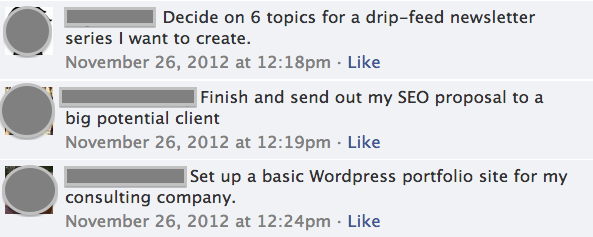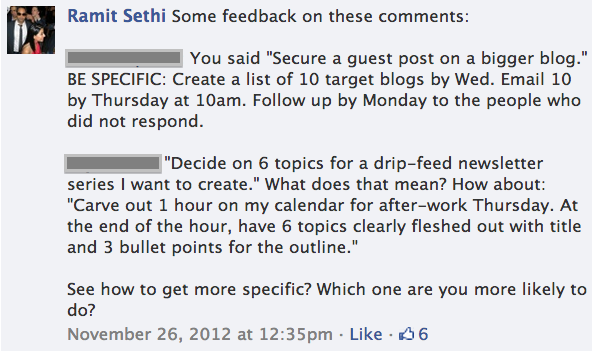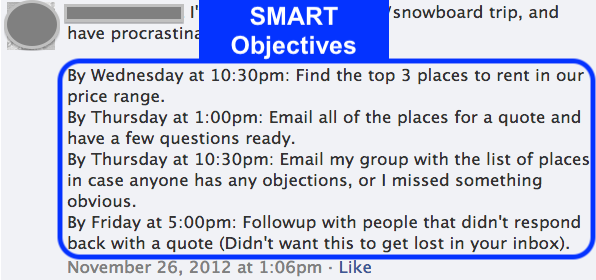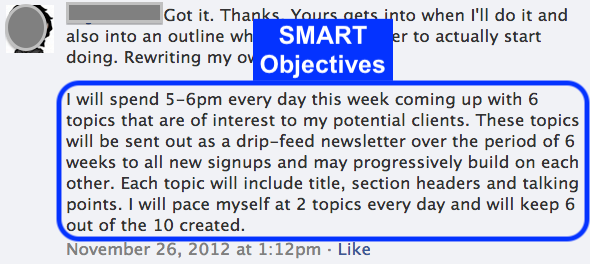New Year’s resolutions are kind of like a drunk uncle. You know you shouldn’t take him too seriously … but you can’t help but laugh and play along when he comes around once a year.
It’s become popular for people to make fun of New Year’s resolutions (they never work!) in an almost gleeful way (why don’t these fake January people get out of my gym??), but few people understand WHY these resolutions don’t work.
The reason is simple: They’re too broad.
When we have a goal like “I want to get healthy,” we set ourselves up for failure because we don’t know where to start.
I know because I used to do the same thing. Back when I was first growing my business, I was in the middle of writing my book and just feeling overwhelmed.
One of my friends asked me, “What’s your number one goal?”
I told him, “I want to be a best-seller, but I also want to generate $X million in revenue and I want to do this publicity and blah blah blah —” He cut me off and said, “Cut the BS. What’s your number one goal?”
Again, I hedged. But he pushed me and forced me to get crisp. Finally, I said, “I want this book to be a New York Times best-seller.”
There it was. We hate giving ourselves constraints because it feels limiting. It feels like we’re giving something up, and that’s exactly what it felt like in that moment.
However, it’s also freeing at the same time. Once I actually said that I wanted to become a New York Times bestselling author out loud, it became crystal clear what I needed to do in order to achieve my goal. I focused all of my attention on those things.
If you want to become successful — in any area of your life — you have to have that kind of focus.
I want to show you how to set goals that’ll give you focus. At IWT, we have THOUSANDS of students who have had their lives changed because we showed them how to set good goals. We know the exact systems to do this and now we want to show you how.
Why New Year’s resolutions fail
A while back, I asked some of my students how they felt after claiming they were going to do something … and then NOT doing it.





I wasn’t surprised at all. While researching one of my courses, I discovered that we would rather continue doing something that doesn’t work than try something new that COULD work — but also could fail. In other words, we’d rather KNOW we’ll fail in a familiar way than fail in a new way.
That sounds insane … but think back to your resolutions from last January. Did you follow through? Do you even remember what they were? Yet how many of us were tempted to make more resolutions this year?
Three more examples:
SAVING ON POINTLESS EXPENDITURES: This is why you see people constantly trying to cut back on lattes or other pointless savings goals … and when it fails, they resolve to “try harder” next time. Code words: “I did all the right things … and look how it turned out.”
WORKING OUT INCORRECTLY: This is also why you see people who’ve been working out for years but don’t really show any visible changes. It’s scary for them to admit that perhaps they’ve been working out wrong for years — and that while it makes them feel “good,” they are not getting the results they want. Code words: “I’m not the kind of person who can lose that kind of weight” or “Lift weights? I’m a girl. I don’t want to get huge!”
SENDING OUT 100+ RESUMES: We have people who send out 100 resumes, then complain about the economy. They never understand that there’s an entire game being played around them, and Top Performers are snatching the best jobs away before average candidates ever see them. Code words: “The Baby Boomers and immigrants stole my jobs … I guess I just need to send out another 50 resumes and wait and see.”
So yes, we want to change, but don’t know HOW to do it. So we do what’s easy, and what the media tells us to do: Make a New Year’s resolution!
Here’s why New Year’s resolutions fail:
- They’re unspecific. We say “I want to get healthy this year” but when faced with the birthday parties in March, the overtime in June, and the family vacation in August, that goal falls by the wayside.
- They’re unrealistic. “I want to go the gym 5x/week.” Really? You averaged twice a month last year. Setting unrealistic, highly aspirational goals is a quick way to guilt and failure.
- They’re based on willpower, not systems. We say, “I want to walk more” instead of parking our car 10 minutes away. We say, “I want to stop messing around and go to sleep earlier” instead of testing different ways of falling asleep (like leaving our laptop in the other room, unplugging our TV, quietly covering our partner’s face with a pillow, etc.). Hey, it’s a test.
But here’s the most haunting part of all: Failing at our resolutions has implications. We start to distrust ourselves. If you’ve set the same resolutions for 5 years, and you never follow through, what makes you think you’ll be different this year?
And yet every year, we set yet another one (because that’s all we know), saying things like, “Ok, this year I’m going to buckle down” and “I’m gonna get serious about ____ this time,” but as we say it, in the back of our heads we KNOW we’re not actually going to do it.
Having a goal isn’t enough. We need a plan and a system.
Enter the SMART Objective.
SMART Objectives: The cure to inferior goals
The SMART goal is the be-all, end-all solution to vague goals that get you nowhere.
SMART stands for specific, measurable, attainable, relevant, and time-oriented. And with each element in SMART objectives, you’re going to want to ask yourself a set of questions that’ll help you develop a winning goal.
- Specific. What will my goal achieve? What is the precise outcome I’m looking for?
- Measurable. How will I know when I’ve accomplished the goal? What does success look like?
- Attainable. Are there resources I need to achieve the goal? What are those resources? (e.g., gym membership, bank account, new clothes, etc.)
- Relevant. Why am I doing this? Do I really WANT to do this? Is it a priority in my life right now?
- Time-oriented. What is the deadline? Will I know in a few weeks if I’m on the right track?
Let me show you the difference between SMART and BAD goals:
I asked some students to share their goals for the week:

These seem like good goals, but they are actually terrible.

Then I gave them some feedback, and they got much better after that.



These new goals work because they employ the SMART Objective. Here, let’s break one down:
You can see how being specific, being realistic, and using systems can help you actually achieve your goals.
If you want to improve your health or find a job that pays you 25% more, hope and willpower aren’t going to cut it. Just like they didn’t cut it last year. Or the year before.
You need a system. Let’s practice building that today.
TO DO TODAY:
I want you to set a SMART Objective for something you want to accomplish THIS WEEK — and then I want you to do it.
You can start by turning a crappy goal you already have into a good one. Here are some more examples of this:
BAD GOAL: I want to be fit.
SMART GOAL: I’m going to run for 15 minutes a day for the next 3 months.
###
BAD GOAL: I want an internship that’s rewarding.
SMART GOAL: I want to intern at an independent publishing house focused on fiction in San Francisco this summer.
###
BAD GOAL: I want to be rich.
SMART GOAL: I’m going to invest 5% of my paycheck into a low-cost, diversified index fund every single month.
###
Do you see the difference between the SMART goals and the bad, vague ones? When you get specific, you know exactly what you want and the measure by which you can achieve it.
Become a Top Performer
To be a Top Performer, you need to be able to set successful goals and establish good habits.
After all, successful people don’t just stew in their guilt. They systematically attack it and identify winning habits to avoid it in the future.
That’s why my team and I created the Ultimate Guide to Habits. In it you’ll learn:
- How to set goals — the RIGHT way. Most people don’t know how to set good goals. They just think of something they want and then start “trying” to make it happen. When they don’t get what they want, they’re left wondering what went wrong. I’ll teach you the best way to set and reach your goals.
- Creating a functional habit loop. Have you ever wondered why it’s so tough to make little changes in your life? And why some people seem to be able to do it with ease? I’ll teach you a simple system that makes forming and keeping new habits effortless.
- How to make any habit last forever. Most are often left wondering, “Why did I lose my motivation?” I’ll teach you why relying on motivation is a loser’s game — and what to do if you ever get off track.
Imagine 30 days from today, jumping out of bed early with tons of energy. You actually LOOK FORWARD to the day — no more feeling frazzled or guilty for not doing enough the previous day — because of the new “peak performance” tools you’re using now.
Maybe you want to start eating healthier, or cook a meal once a week. Maybe you want to start a business, or even just read one book a month.
No problem. Start small. Pick one or two things to use these powerful techniques on, and watch what happens.
Just sign up below and I’ll send you a free copy of the Ultimate Guide to Habits right away.
Why New Year’s resolutions fail is a post from: I Will Teach You To Be Rich.
